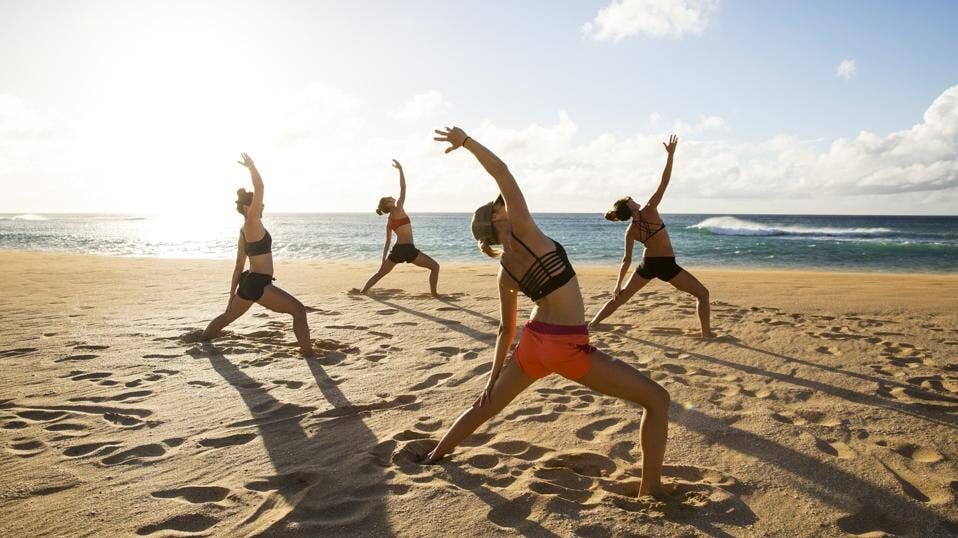When it comes to getting ready for a vacation, 37% of survey respondents claim they feel pressure to look a certain way before packing their bags. Concern over one’s appearance has a greater impact on younger generations, affecting 51% of Gen Z and 42% of millennial respondents. Meanwhile, 35% of Gen X and 23% of baby boomers report feeling pressure to lose weight or look a certain way before a vacation.
The survey revealed a significant difference among genders, too, with 42% of women reporting feeling the need to look a certain way prior to going on vacation, compared to 31% of men.
“Unrealistic beauty and body standards that accompany toxic messaging run rampant in the summertime,” says Olivia Verhulst, a New York-based psychotherapist and Forbes Health Advisory Board member. “Getting your ‘summer body’ is one of those messages that perpetuate the idea that there’s a gold standard for how you need to present when the air is hot and our bodies may be more visible,” she adds.
However, when asked how they feel about their body image currently, more than half of respondents (51%) reported feeling somewhat or very satisfied, while nearly a third (31%) felt somewhat or very dissatisfied.
Survey responses suggest that having a negative body image overall more commonly affects older generations, as 38% of baby boomers and 37% of Gen X reported dissatisfaction with their appearance, compared to just 26% of millennials and 21% of Gen Z. Women were also significantly more likely to report unhappiness with their body image, at 39%, in comparison to 22% of men.
Those who reported feeling somewhat or very dissatisfied with their appearance were more likely to say they feel pressure to get “summer body ready,” at 49% and 56%, respectively. However, feeling the need to get fit or lose weight before a vacation persists even for those who reported feeling somewhat satisfied (36%) or very satisfied (29%) with their body image.
The fact that Gen Z respondents seemed to have a higher body satisfaction yet also felt pressure to look a certain way for vacation could be due to the fact that even though this generation is more attuned to messages about positive mental health, there is still a disconnect between knowing one should love their body and seeing carefully crafted images of others on social media and drawing a comparison, notes Judy Ho, Ph.D., a triple board-certified and licensed clinical and forensic neuropsychologist and Forbes Health Advisory Board member based in Manhattan Beach, California.
“There may be a form of imposter syndrome going on where they are trying to give themselves body positive messages, but when encountering the plethora of ‘perfect bodies’ on social media, they feel incongruent and negative feelings and thoughts arise,” she says.
To increase one’s self-confidence and foster a positive body image, Verhulst recommends identifying and naming negative self-talk. “It’s hard to maintain positive images of [ourselves] when we are letting our negative self-talk run rampant,” she says, adding that we don’t always recognize when we are speaking to ourselves in hurtful ways. “And the problem with that, is that our voice is the one we are hearing the most, all day long, all the time.”
When negative feelings about our bodies surface, it may be helpful to replace preoccupation with one’s body image with positive thoughts, says Sabrina Romanoff, Psy.D., a Harvard-trained clinical psychologist and Forbes Health Advisory Board member based in New York City. “The most effective way to change your thoughts is to notice when you’re trapped in a vicious thought cycle [and] interrupt it—either by getting up and changing your environment, or changing the topic—to ultimately rewire your brain to have a different association to your body,” she says.
“Do this by replacing negative thoughts with healthier alternatives,” says Dr. Romanoff. “For example, replace the thought ‘I don’t like how I look in a bathing suit,’ with ‘I feel so grateful to be sitting on the beach with my loved one,’ or get grounded by engaging your five senses at the beach, or go for a walk along the ocean,” she suggests.
How Does Body Image Affect the Ability to Enjoy Vacation?
Survey responses indicate that having a negative body image may contribute to one’s ability to enjoy vacations. According to survey results, 45% of those who are somewhat dissatisfied and 61% of those who are very dissatisfied with the way their body looks felt that their body image directly impacted their ability to enjoy vacations, compared to 24% of those who are somewhat satisfied and 31% of those who are very satisfied with their appearance.
More than half of respondents (56%) also claimed their body image has made them want to abandon their vacation plans altogether. The inability to enjoy a vacation due to one’s feelings toward their body more greatly affects younger generations, with 42% of Gen Z and 39% of millennials saying they’ve felt this way, compared to 32% of Gen X and 19% of baby boomers. Additionally, feeling negative about one’s body has a significantly larger impact on women’s ability to enjoy their vacations (40%) than men (24%).
What’s more, different types of vacations may impact how much pressure someone feels to get in shape. In fact, the pressure to look a certain way was most commonly felt when going on beach vacations, particularly with family (56% felt pressure), friends (52%) and significant others (43%). Meanwhile, feeling the need to get fit is slightly less prevalent for city vacations with family (40%), friends (37%) and significant others (25%) and for adventure vacations centered around activities like skiing or hiking, 34% felt pressure with family, 37% felt it with friends and 27% with significant others.
While struggles with body image may feel unavoidable, “we can find ways to greet [these struggles] and effectively manage them,” Verhulst explains. To set yourself up for success, Verhulst recommends “bringing comfortable clothing that feels non-stress inducing, not creating strict ‘weight loss goals’ in accordance with certain dates that align with vacation and focusing attention on the experiences and relationships.” Additionally, mindfulness practices can help you stay present during vacations, she says.
Why Do People Feel Pressure to Get in Shape for Summer?
A large majority of respondents who report feeling the pressure to get in shape for the summer claim they fear judgment from others (61%). Other factors that contribute to feeling the need to get “summer body ready” include societal expectations to look a certain way in specific outfits like bathing suits (47%), influence from social media (31%), previously receiving negative comments about their body (30%) and pressure from advertising or marketing campaigns (15%).
Coming of age in a world where smartphones and Wi-Fi access are nearly ubiquitous, it may come as no surprise that Gen Z respondents were more likely to feel pressure to look a certain way from social media than any other generation, at 52%. Additionally, 53% of women reported feeling societal pressure to look a certain way in specific outfits, versus 39% of men.
“With social media, people are bombarded with unrealistic, edited and posed images of body ideals,” explains Dr. Romanoff. “This contributes to negative body image and insecurity,” she says. “It’s helpful to limit time on social media and unfollow people who might spark feelings of insecurity.”





